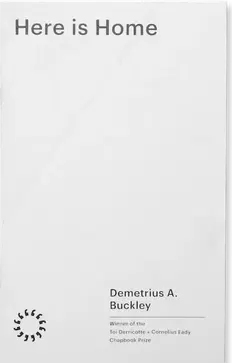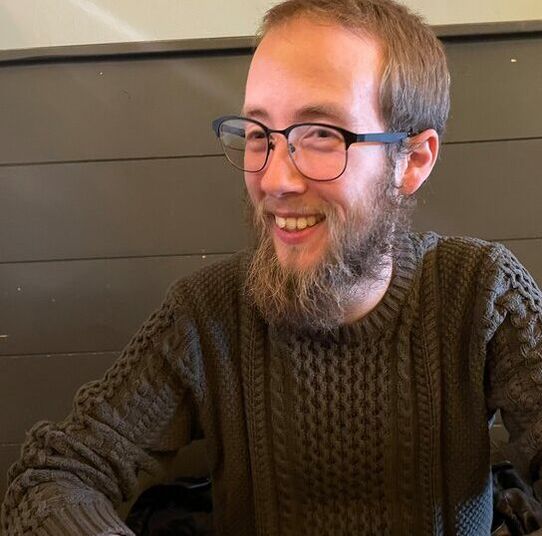You Can’t Make Up Voices, Only Hear Them:
|
|
I first encountered Demetrius A. Buckley’s poetry in 2020 in the Michigan Quarterly Review (MQR). His poem “Letters from Daddy (29),” MQR’s winner of the Page Davidson Clayton Prize for Emerging Poets, depicts the yearning an incarcerated father feels for his daughter on the outside. “My love child of song,” the poem begins, “child of some place / names aren’t meant—needed, if / you can hear me in this prison yard, / then I sing prayer like gospel / in a four wall monstrosity of scribbled letters.” The poem is thick with imagery and longing, claustrophobia and restlessness. (As a poet myself, I found the poem very moving and sent Demetrius a piece of fan mail. To my great luck, Demetrius humored my letter, and we began a correspondence that continues to this day.) “Letters from Daddy (29)” is simultaneously a love poem to the speaker’s family and an elegy to what they can’t have. It is the quintessential Demetrius A. Buckley and the building block for his chapbook published two years later: Here is Home, which won the Toi Derricotte and Cornelius Eady Chapbook Prize.
Here is Home comprises 10 poems, each as heartrending and vivid as the next. My favorite poem in the chapbook, “The City Folk Knows Home,” depicts the Detroit, Michigan, landscape: “daisies…next to a field of weeds / that sway like crowds in the stands…big bro grilling pork for the children / not yet men but forced to mature / as the young girls tighten their ponytails…a neighbor’s dog bark / is sacrilege.” As a fellow Michigander currently displaced in the Southwest, I feel a connection to these images, these breaths of movement. I feel like I’m standing in these weeds and listening to children playing basketball. The 37 lines that make up “The City Folk Knows Home” carry just two sentences, the second of which makes a revelatory turn about halfway through the poem: …before money muddles their minds and democracy unsettles with police shooting sit-ins, walk-outs, back when Detroit’s Black Bottom felt like Harlem and poets and musicians and actors gathered in nightclubs filled with jazz which is now ruins we blow diesel in, a place still breathing in its half lung, and Momma remembering the second riots when the whites packed up and took their stores and shopping centers… In the lines excerpted above, Buckley gives witness to the history of Detroit—not only the art and music that make up its heritage, but also the racist cause of its unraveling: racial violence, then white flight, then gentrification. The poem echoes the voice of Jamaal May, another contemporary poet native to Detroit, in its call to recognize Detroit as a place more than abandoned or destitute: a place called home. After Buckley chronicles the racism and gentrification that have attempted to strip bare his city, the speaker pauses and takes himself outside of the poem for a moment to ask, “did I also say this is my home.” This inquiry, slyly posed without a question mark, demands the same witnessing with which the speaker has graced Detroit earlier in the poem. Finally, the poem introduces a new pronoun, “we,” in the very last line. This addition creates a sense of unity implicit in the underbelly of the poem since its beginning. It asks the reader to watch, to listen, to learn. To love. To return to the “Letters from Daddy” sequence, Here is Home includes four such poems. Similarly to the poem printed in MQR, each one is a culmination of poignancy, grief, and hope. “Letters from Daddy (36)” employs an energetic anaphora in the form of “here”: “Here is where I lie in solemnly swears”; “Here, I can shuffle into a room falling / over itself”; “Here is where I pretend the lobby has you”; “Here, prayer comes too easy.” These instances of “here” (which are by no means comprehensive) point to isolation, entrapment, incarceration. In this poem and in the three that follow, the speaker’s daughter rests just outside his line of vision. She’s asking who the automated telephone operator is, she’s asking why he can’t come home, she’s asking if he loves her. The question of love—the problem of love—is one on which the entire conceit of the chapbook rests. How do we love our families when they or we aren’t there? Can we trust it? Will it wait? In the final poem, “Letters from Daddy (507),” the speaker cautions us, “that in the dark / everything is love.” While I interpret that line to mean, in the context of the poem, “that in the dark / everything feels like love,” there is something breathtaking about the possibility of an omnipresent love, a chameleon-prayer that changes color to match gradations of light and dark, things and no-things. It is perhaps the same chameleon behind the declaration, “You / can’t make up voices, only hear them.” This is Buckley’s truth-telling at its finest: a line stunning in its accuracy and grace. This is what we call poetry.
|


